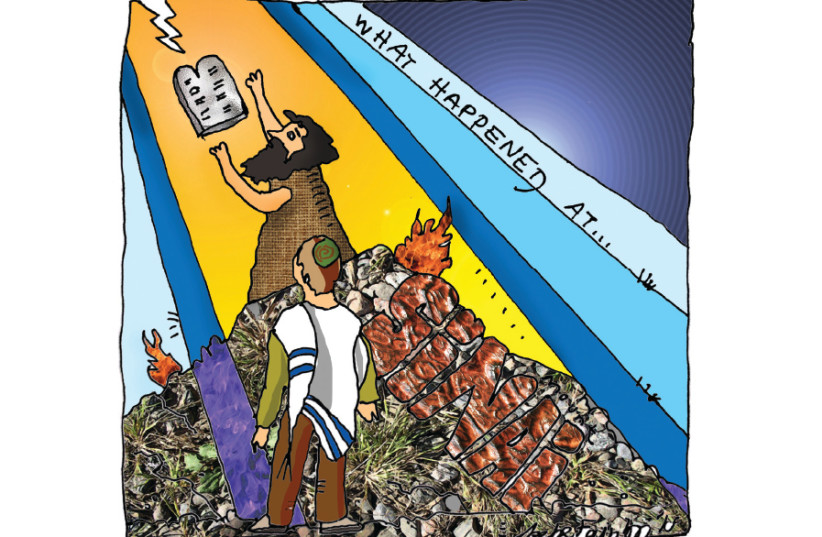God had a problem. How does an infinite divine being communicate His thoughts to a bunch of finite, primitive, naked apes? In other words, how is it possible for God create a relationship with man?
There were two choices. God can remain silent, and when we cry out to Him, He can say, “Hey, I’d love to respond, but I am paralyzed by your inability to understand me!” Or God can compromise and translate His thoughts into words, terms and ideas that people can understand.
By giving the Torah to the Israelites, God had to restrict Himself, squeeze Himself not just into human language, but into the specific human language of Hebrew, and not just Hebrew, but into a Hebrew that could be understood by the former slaves standing around the mountain.
That means God needed to speak in a primitive, patriarchal, agrarian Hebrew. Let me unpack that for a moment. When we speak about language, it is not just the words themselves we need to worry about, but how they are understood in the specific time they are used. If I were to tell someone that they look “cool,” we all know what I mean. But a thousand years from now, with no cultural context, one might misinterpret what I am saying and think that I was remarking about your ability to keep a cold body temperature against the ravages of global warming.
It is not just words, but a load of cultural baggage that comes along with those words. Had you asked me to “Friend” you 20 years ago, I would have thought you were a lonely person; and had you asked me to “Follow” you, I would think you suffer illusions of grandeur. Asking a date up for a “cup of coffee” at the end of the night, is not an offer for a hot caffeinated beverage. But you need to be a part of the cultural milieu to understand that.
BY GOD introducing His infinite mind into the Hebrew of the ancient Israelite, God risked “freezing” His thoughts into a specific time and place, and risked making them irrelevant to subsequent generations and thus eventually turning the Torah into a fossil.
Let’s not forget, that if there was even one generation in Jewish history in which the Torah was not valuable and relevant, we would not be here today.
What God did to avoid that was to introduce along with the written Torah, an oral Torah that was far more fluid and dynamic than the written one. The oral law which would become the basis of rabbinic Judaism was and remains the real center of authority in Jewish life, sometimes even “over ruling” the written law.
I often explain this idea to my students in language that they can understand. I liken the written law to the iPhone. Once it leaves the factory, the physical form of the phone does not change. It remains with the same size, shape, screen, camera and battery. But Apple sends periodic system updates from the cloud to update my phone and what I can do with it. So while my phone may be old, it is running a new and dynamic operating system.Rabbinic Judaism is the “system updates” to the hardware of the Torah. It allows the words to remain exactly the same, but gives renewed meaning to them in each and every generation.
The problem today is that because of the challenges of Reform and Conservative Judaism, Orthodox Judaism paralyzed itself. Not ready for the questions posed by modernity, traditional Judaism was like a deer in the headlights, frozen in place and unable to move. Orthodox Judaism initially gave a knee-jerk reaction to the questions of change by answering that “we don’t change things.” Which is not just over overly simplistic, but patently false.
Halacha does change and has changed throughout the generations. We lack a rabbinic leadership today that has the guts to affect the changes we need.
THE 20TH century gave two real challenges to Halacha. The first was modernity and the second was sovereignty.By modernity for example I mean the challenges raised by electricity, medical science, space travel etc., all questions that Halacha was not ready for; and by sovereignty I am referring to the problems of running a democratic Jewish state, a situation that Halacha never even dreamed of.
An example that was raised in an article I saw recently was whether or not Prime Minister Naftali Bennett should go to the synagogue on Shabbat. Going to the synagogue is a wonderful and important part of Judaism, but it is not an obligation. The movement of the prime minister from one place to another necessitates the “violation” of many Shabbat restrictions. The rabbis interviewed, all tremendously learned, and sympathetic Zionists, seem to think it is better for Bennett to stay home, but you can see from their answers that they too are puzzled by their own response.
And while we can all agree that a security threat allows the prime minister to “violate” the Shabbat (in quotes because it would not then be a violation), what about a bus drivers’ strike that begins Friday night? On the one hand “it is just a labor dispute” but on the other, if the drivers are still on strike Sunday morning, men and women cannot get to their jobs, children cannot get to school, soldiers cannot get to their bases. The economy is threatened along with the security of the state. And let’s take the soldiers out of the equation. Can we recognize that just the economic damage to the state will weaken it enough to call it pikuach nefesh?
Unfortunately, I don’t have the learning, nor the broad shoulders to answer those questions, but I do know enough to ask them. Because from what I see it seems that we have now fossilized even the oral law, thus turning God’s original problem into our problem. ■
The writer holds a doctorate in Jewish philosophy and teaches in post-high school yeshivot and midrashot in Jerusalem.

